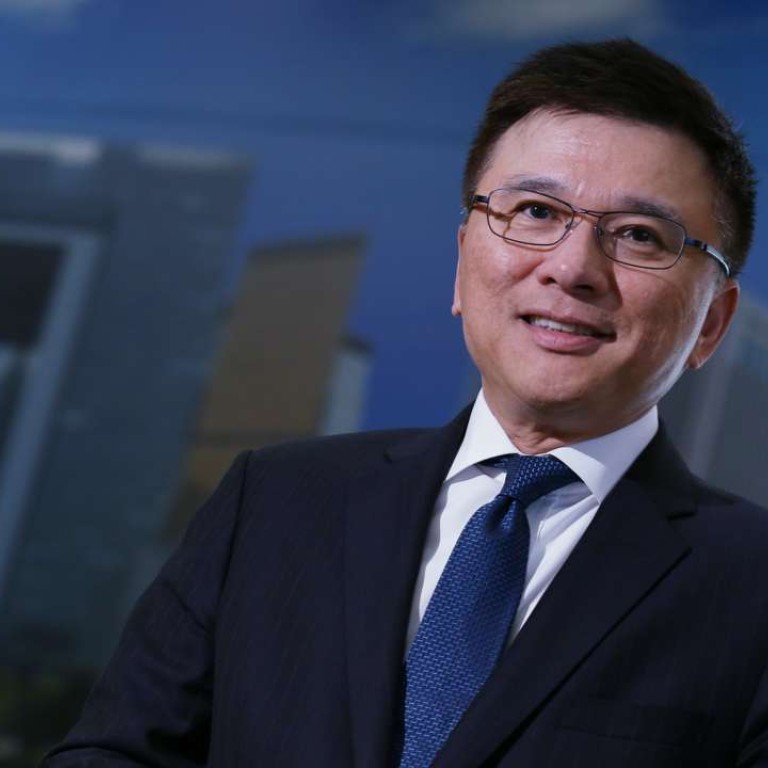
No need for a third stock board, but IPO reform and crowdfunding oversight are high on the agenda, says financial services chief
Hong Kong should improve the quality of new listings and bring in a new technology fund raising platform, according to Secretary for Financial Services and the Treasury Chan Ka-keung.
The financial minister however believes there is no need for a proposed third board. He also rejected calls to abolish the stamp duty to encourage high frequency trading.
Chan unveiled the whole range of financial reform plans on local financial markets in an exclusive interview with the South China Morning Post.
“There is room for improvement in the initial public offering regime as the performance and quality of some new listing companies was not so good,” he said.
Hong Kong has maintained its leading role in IPOs globally. The city’s stock market ranked No 1 last year in terms of funds raised, a role which it is on track to maintain this year as first quarter shows Hong Kong once again ahead of the pack.
“The amount of funds raised is only one aspect to assess the IPO market. We should also look at the quality and performance of these companies post IPO,” he said, adding that the Securities and Futures Commission and stock exchange is working on a consultation paper on how to improve the listing regime.
SFC chairman Carlson Tong Ka-shing last year said the commission would review the Growth Enterprise Market with an eye to improving oversight of the market and address concerns regarding unusual share price movements and back door listings.
“The consultation paper will seek ways to streamline the IPO process and to suggest on how to improve the quality of the new listings,” he said,
Chan does not see an urgent need to launch a third board anytime soon. Hong Kong Exchanges and Clearing Chief Executive Charles Li Xiaojia said in January that the exchange would consider setting up a third board tailor made for companies which could not meet the profit requirements of the main board and the operational requirements of the GEM.
“It is too early to talk about launching a third board or any new market. Let’s look at the problems of the current market and to find a solution to fix the problems first,” Chan said.
Chan welcomed the government think tank Financial Services Development Council which last month suggested the SFC study ways to regulate crowdfunding. Hong Kong currently bans equity crowdfunding while the US and UK have recently introduce regulatory oversight of these activities. Crowdfunding refers to the use social media or other internet platforms to enable individuals or companies to raise funds.

“We would need to study how we can have a proper regulation to allow these new types of fund raising activities while at the same time we need to make sure investor protection measures are in place,” he said.
Chan also welcomed the introduction of various type of fintech to allow banks and brokers to use new technology.
Chan however said he is less inclined to abolish or reduce the stamp duty on stock trades as a way to attract high frequency traders to the city, as requested by some institutional investors.
Hong Kong charges a stamp duty of 0.1 per cent of the value of a stock trade. Stock exchanges in Tokyo and New York do not levy a charge on stock trades, enabling high volume traders to flourish.
In high-frequency trading, traders use computer programmes to hold very short-term positions in equities, allowing them to profit by the minute market movements.
This type of trading boosts trade volumes. It is estimated that some 10 billion shares change hands on the New York Stock Exchange on a daily basis, compared with just a few million in the 1980s.
“Hong Kong does not need to change our stamp duty to encourage high-frequency trading to boost turnover. While this type of trading can bring in turnover and liquidity, we have to ask if these are the type of liquidity we want. High frequency trading is not stable liquidity...Hong Kong should attract long-term and stable funding and not those from the high frequency traders,” he said.
Chan also said stamp duty from the shares transactions amount to HK$20 billion to HK$30 billion annually, which is an important source of government income.
He said what would be more important is to develop more cross border trading between Hong Kong and mainland China. He anticipates the Shenzhen and Hong Kong stock connect will launch in the second half of this year.
He does not expect any changes to the existing southbound quota, which limits participation in the scheme to investors with a minimum balance of 500,000 yuan (HK$599,000).
There are no minimum-balance restrictions on in Hong Kong participating in northbound investment into Shanghai.
“We would study other forms of cross border trading between Hong Kong and the mainland. These schemes would be important for Hong Kong to play a role in China’s open up of its capital accounts,” he said.

